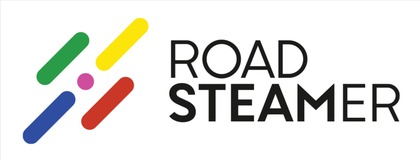Road-STEAMer Real-Life Use-Cases
Discover the STEAM criteria application in real life

This section presents the five (5) workshops conducted from February 2023 to May 2024. Four (4) of the workshops were delivered online and one (1) in-person. Two (2) workshops were part of other larger STEAM-related events.
Workshop 1: Setting the stage
The first Road-STEAMer workshop on STEAM practices as RLUC explored the dynamic intersection of education, innovation, and societal relevance. It was delivered online, convened amog Road-STEAMer partners, including an external expert invited by the leader of WP4 (TRACES).
The 25 participants were invited to collaborate using a Mural Board on aspects of STEAM practices that shed light on real-life settings and considerations. They explored the connetion between STEAM and societal/world challenges, how pedagogical approaches are more suitable for STEAM practices as RLUC, the skills needed and role of delivery settings.
The most eminent workshop's thematic were:
- World Challenges Addressed by the Practice;
- Approaches Employed;
- Skills Addressed:
- Delivery Settings.
Workshop 2: Addressing societal challenges and transferable skills to tertiary education
The second workshop (in-person) was conducted in the framework of the OTTER project’s “Beyond the classroom: rethinking STEAM education” final event which took place in February 2024.
The OTTER initiative explored Experiential Learning Outside the Classroom (EOTC), encouraging hands-on STEAM learning in museums, heritage sites, and urban areas to foster holistic engagement and active citizenship. Despite EOTC's effectiveness, it is underutilized, and OTTER aimed to advocate for its broader adoption and provide support to educators for more experiential learning methods across Finland, Spain, Hungary, Ireland, and the Netherlands.
In this context, Road-STEAMer was invited to contribute to a panel, present a poster, and conduct a workshop focusing on STEAM practices as RLUC. The workshop was delivered in a world-café style, with around 30 participants joining our Road-STEAMer table. The participants came from a variety of backgrounds, including research, academia, school education, non-formal and informal STEAM practice and policy making
Workshop 3: Learning science through theatre as a real-life use-case practice
The third workshop took place In Greece, in the context of "Learning Science Through Theatre", an initiative merging science and theatre to make science education creative and community-oriented.
The Road-STEAMer workshop was delivered online with 20 participants (teachers, school advisors, science theatre experts and STEAM reseacrhers), who were presented with the Road-STEAMer criteria and were invited to reflect upon their own practices by paying particular attention to societal challenges, skills needed and addressed as well as delivery settings.
LSTT and other STEAM practices like Global Science Opera and iMuSciCA combine arts, collaboration, and technology to enrich science education. Discussions emphasized the role of interdisciplinary approaches and the importance of integrating arts meaningfully into STEAM education.
Workshop 4: STEAM practices in Poland
The fourth online workshop took place on April 2024. Held with Polish STEAM practitioners, researchers and teachers gathered through the network provided by the Copernicus Science Centre, this workshop emphasized the importance of personalization in STEAM activities, especially post-COVID-19, to foster collaboration and real-world connections. The specific focus was on gaining feedback on the application of the Road-STEAMer criteria on the ground and reflect on it.
Challenges included teacher vulnerability in adapting new technologies and managing limited resources, alongside a renewed interest in encouraging creativity and open-mindedness in science education.
Workshop 5: STEAM in Emergency Settings (Ukraine)
The fifth and final online workshop took place in May 2024. This session examined STEAM's adaptability in crisis conditions, specifically in Ukraine. It was organised by the Junior Academy of Science in Ukraine and gathered 20 participants interested in this opportunity.
Participants discussed the unique aspects of STEAM practices during emergencies, such as using digital tools to integrate arts and science for student engagement under stress. Suggestions included emphasizing task commitment and adapting STEAM activities to sustain engagement in emergency contexts.
The discussions also covered more general types of activities like Space Living Labs - connected to thinking-making-doing, real-world connection, and inclusion-empowerment-personalisation.
Overall, the workshops underscored the value of diverse, experiential STEAM methods, especially for real-world, community-linked, and crisis-responsive learning.
For more info and details, read it here!



